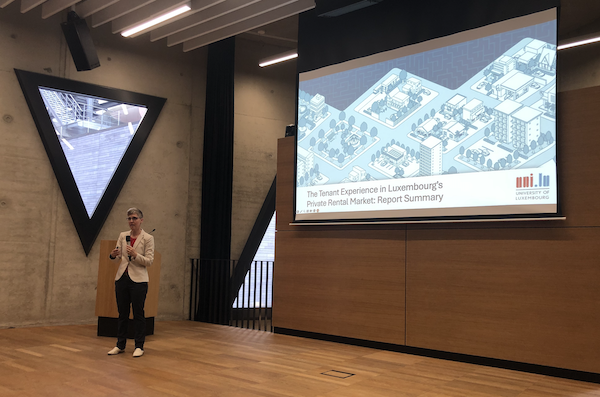 Lindsay Flynn, Associate Professor of Political Science at the University of Luxembourg;
Credit: Ievgenii Karanov, Chronicle.lu
Lindsay Flynn, Associate Professor of Political Science at the University of Luxembourg;
Credit: Ievgenii Karanov, Chronicle.lu
On Tuesday 20 May 2025, Associate Professor of Political Science at the University of Luxembourg, Lindsay Flynn, presented a report entitled “The Tenant Experience in Luxembourg’s Rental Market”, based on a joint study carried out by the Mieterschutz tenants’ association and political science researchers from the university.
The report highlighted that many tenants expressed negative perceptions of Luxembourg’s rental market, with “unfairness” (47%) and “insecurity” (24%) cited most frequently. Poor housing conditions also emerged as a recurring concern. According to the study, nearly one in five tenants who contacted the Mieterschutz association reported problems in their accommodation, with vulnerable groups and households with children particularly affected. The most commonly mentioned issues were mould or humidity, followed by structural or equipment deficiencies, heating problems and water leaks.
The research is based on anonymised correspondence between nearly 300 tenants and Mieterschutz, as well as through focus groups in which tenants discuss their experiences with the research team.
"The five biggest issues that bubble up to the surface in the focus groups: unaffordability - over two-thirds of participants identified affordability as a key concern; perceived selection criteria - this refers to whether or not a person thought they were rejected from a lease agreement for any particular reason, with half of the participants identifying this as a challenge at some point," said Lindsay Flynn. "Just under a third mentioned both advertising practices or fees associated with the rental contract and agencies. Smaller percentages, but still notable, include around 20% raising concerns about lease conditions and 16% identifying some form of discrimination they experienced during the access process. So, in the report you can see all five of these.”
The report also examined the rental experience across three key phases: the search for housing, the tenancy period and the end of a lease. Difficulties in finding accommodation were often linked to unaffordability, perceived selection criteria, discrimination and unclear or unfavourable contract conditions. During tenancy, common issues included poor dwelling conditions, rent increases and disputes over repair responsibilities. Lease terminations were frequently marked by challenges such as the return of deposits, inventory disagreements and cases of early termination or eviction.
“A situation which is already tense can be exacerbated by various factors, human, legal or contractual,” explained Prof. Lindsay Flynn. The study found that many tenants were uncertain about their rights, particularly concerning rent increases, responsibility for repairs and the legality of contract termination. Ambiguities in contracts, technical language and lack of responsiveness from landlords contributed to tenant frustration, with many reporting a deterioration in the landlord-tenant relationship following conflict or unanswered requests.
The report further noted that vulnerable socio-economic groups and households with children were disproportionately affected by urgent issues, especially in relation to landlords’ selection criteria and the quality of housing.
Moreover, the report includes a chapter outlining policy recommendations tailored to the Luxembourg rental market. Prof. Flynn noted that a lack of accessible information and limited awareness of rights and obligations can strain landlord-tenant relations. She suggested that promoting transparency and offering coaching could help prevent issues from arising.
Persistent problems such as affordability and poor housing conditions require a multi-layered policy response, especially for vulnerable households and families with children. Formal tools for communication and dispute resolution could reduce tensions and misunderstandings. The report also called for long-term strategies, such as improving transparency around utility billing and enhancing support for tenants to access financial aid programmes. Tenant-focused organisations are encouraged to review how they allocate resources, with greater emphasis on urgent housing and financial needs, and to strengthen the broader support network for low-income households.
Among the attendees at the report presentation was Luxembourg’s Minister of Housing and Spatial Planning, Claude Meisch, who emphasised the need to improve tenant protection and access to information. He stressed the importance of ensuring that everyone in Luxembourg can access safe and affordable housing.
“A home is not a luxury. A home is a right,” said Minister Meisch. He acknowledged that many tenants, particularly those with children or lower incomes, face disproportionate challenges, and highlighted the need for clearer communication, stronger support mechanisms and continued investment in affordable housing.
In response to a question from a student regarding how the housing system could better support students and young professionals, Minister Meisch highlighted several government initiatives. He noted that a recent call for projects aimed at creating state-subsidised affordable housing specifically targets young people, including early-career professionals.
“This is just one example of how we can respond to the current situation,” he said, referring to demographic and economic developments that have increased housing demand. The minister acknowledged the limited availability of affordable housing and outlined further actions, such as legislative amendments to increase subsidies and faster authorisation procedures for construction.
He emphasised the need for collaboration between the state, local governments and private sector actors. “Sometimes I have the impression we have the money, but we need actors who want to use it,” he said, adding that involving all stakeholders - from municipalities to associations - is essential to expanding the affordable housing sector.
The report draws on data and surveys from public institutions such as the EU-SILC survey and the Housing Observatory (Observatoire de l’Habitat) to contextualise its findings. Professor Lindsay Flynn stressed the need for “a full and bilateral view”, adding that this would require further research to include additional perspectives, such as those of landlords and unresolved dispute cases. “Only with this can policy recommendations be truly effective,” she noted.
The study was commissioned by Mieterschutz Lëtzebuerg and carried out with financial support from Luxembourg’s Ministry of Housing and Spatial Planning, as well as the FNR ATTRACT research project “Proactive Policymaking for Equal Lives (PROPEL)”, funded by the Luxembourg National Research Fund (FNR).








